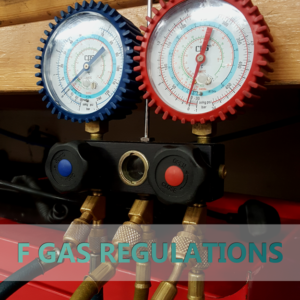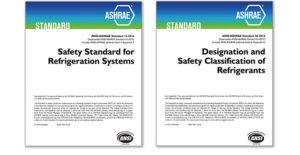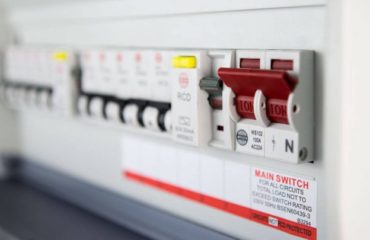The supposedly ground-breaking European F-gas regulations have become a farce, with the authorities seemingly unwilling or unable to stem sales of illegal refrigerant.
A major part of the regulations, the HFC phase-down, was seen as a model for the rest of the world, an example of Europe’s pre-eminence in the fight against climate change. Sadly, the failure of the European Commission and the relevant authorities in the member states to properly police the regulations has set an example of ineptitude, inaction, obfuscation and lies.

The high prices and supply issues as a result of the phase-down timetable has sucked in an enormous amount of cheap contraband refrigerant this year, as our recent reports have shown. Much of it is probably imported outside of the quota system, sold to anyone regardless of whether or not they are F-gas certified, and most appears to be in disposable cylinders – a type of packaging which was banned in Europe in 2007.
So valuable has refrigerant become that it is now the target of thefts across Europe. Some of this is obviously well organised. The Cooling Post has highlighted two significant recent thefts involving a total of over 20 tonnes of R134a. We have reports of many other thefts involving smaller amounts and anecdotal evidence of opportunistic thefts from across Europe.
Yet why would anyone want to steal the gas when they can, it would appear, quite easily import a container load of refrigerant from China with very little chance of getting caught? The potential profits are astonishing and the potential fines, in comparison, are miniscule.
Unmoved
DG Clima, the European Commission’s body ultimately responsible for overseeing this farce, are unmoved by the high refrigerant prices, smugly claiming that they are well within the range that they expected as a result of its phase-down measures.
If that is the case, the Cooling Post would like to know why they were not clever enough to foresee that this would encourage the rampant law-breaking which we are now witnessing? And why did it not ensure that procedures were put in place by member states to counter the illegal activity that would obviously ensue?
Openly sold
In reality, dealing with this illegal activity does not require the services of Hercule Poirot. It’s not as if the illegal gas is being sold from the boots of cars in deserted car parks in the dead of night (although it may be as well). It is being quite openly sold via various internet websites in full view of the authorities, should they care to log on and look.
Let’s be clear here, there are perfectly legal refrigerant vendors using the internet as a sales channel. And they must be equally appalled that this medium is swamped with these illegal sales. Not only are the high GWP gases like R404A and, in particular R134a, being sold but this illegal trade is also sucking in HCFCs like R22 and even CFCs.
This is happening across Europe and in large quantities. A vendor on a German website over the weekend was offering discounts on 30 or more disposable cylinders of R134a, R404A and R507. Discounts on lots of 10 or 20 are not unusual. Photographs posted by vendors also suggest they have access to huge stocks.
Yet, DG Clima refuses to accept there is a problem. In response to concerns from the Cooling Post, an individual at DG Clima, who wished to remain anonymous, maintained that the Commission recognised that higher prices were making illegal trade more attractive but quoted a recent report which found no evidence of large scale illegal trade. Laughably, and as an indication of how out of touch DG Clima is, that report conducted by Öko-Institut e.V was based on trade figures from 2016 and has no relevance to the current situation.
UK non compliance
In some cases the inability to police the market comes down simply to inadequate funding.
In July, the UK government rejected calls from industry for greater funding for the Environment Agency, the body charged with policing the F-gas regulations in the UK. It claimed that “compliance with the HFC phase down was generally good” and that the Environment Agency monitored sales on online marketplaces such as eBay and Amazon on a “daily” basis.
Having been monitoring the internet ourselves from the beginning of the year, the Cooling Postwas in a position to see that this was clearly either a lie or, at best, the Environment Agency’s internet monitoring was being carried out by someone who had not the faintest clue what they were looking for.
Eventually and, it has to be said, belatedly, the UK Environment Agency insisted that vendors add a note about their, and their customers’, legal responsibilities regarding the F-gas regulations. Incredibly, the Environment Agency had also directed these requirements at vendors who were clearly selling refrigerant in illegal disposable cylinders, yet took no action against them.
Ignored
Some of the above is based on the best evidence we have, as the Cooling Post is only permitted to contact the UK Environment Agency through its press office. Sadly, that department now steadfastly ignores all correspondence and requests for information and comment from the Cooling Post. Perhaps they’re embarrassed.
Despite adding notes about the F-gas regulations it became clear that the UK sellers were not taking this seriously. In a number of subsequent undercover contacts with these online advertisers by the Cooling Post, posing as a potential purchaser, it became obvious that the vendors were prepared to sell to anyone. As suspected, they were merely paying lip-service to the Environment Agency’s requests and were quite prepared to ignore the regulations.
The Cooling Post passed its concerns to eBay, which was the main source of internet activity in the UK, and that particular website is now virtually clean.
In fairness, the Cooling Post has always found that eBay is swift to act when they are made aware of infringing product. Similarly, nearly 200 adverts for R134a, alone, in illegal disposable cylinders were eventually removed from eBay’s German classified website Kleinanzeigen when the Cooling Post pointed this out to them. That website is also, now, virtually clear of all such material.
Frequent checks
DG Clima maintains that member states are taking various measures to prevent illegal trade, including “customs training, spot checks, meetings between the environmental ministry and environmental inspectorates and customs authorities, control instruments to prohibit online trade of refrigerants on the internet, frequent website checks and the establishment of a relevant working groups dealing, inter alia, with these issues”.
Someone is just not telling the truth here. On Friday we reported on one particular high profile website in Poland – a country hit hard by the illegals – which was carrying at least 150 adverts for refrigerant in illegal disposable cylinders. Pleas from the Polish refrigerant suppliers association PROZON to the operators of the OLX website for the material to be removed have so far been ignored.
So where is the support and action from the Polish authority whose duty it is to police this?
DG Clima maintains that where the Commission considers that a member state is not taking sufficient action to implement EU legislation, the Commission may initiate infringement proceedings. There are currently no infringement case linked to the illegal trade in HFCs.
There has also still been virtually no prosecutions of individuals or companies found to be contravening the F-gas regulations.
Next year, a global phase down will begin under the Kigali Amendment to the Montreal Protocol. Let’s hope that some lessons are learned from this European fiasco or the coming worldwide illegal trade in refrigerants will make Europe’s ineptitude appear insignificant.
Source: https://www.coolingpost.com/blog-posts/end-this-f-gas-farce/




